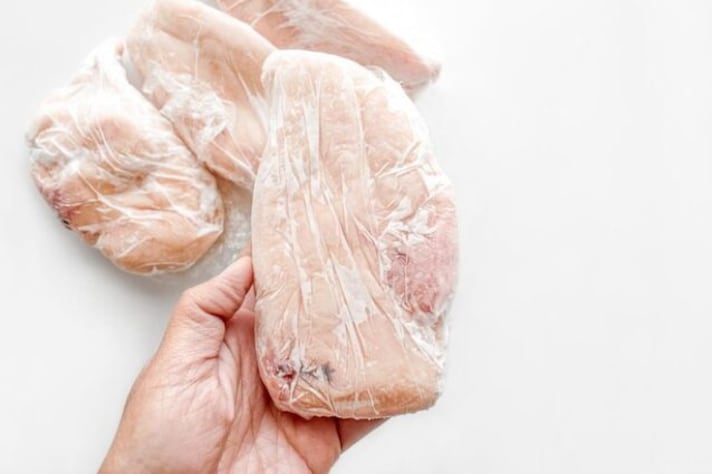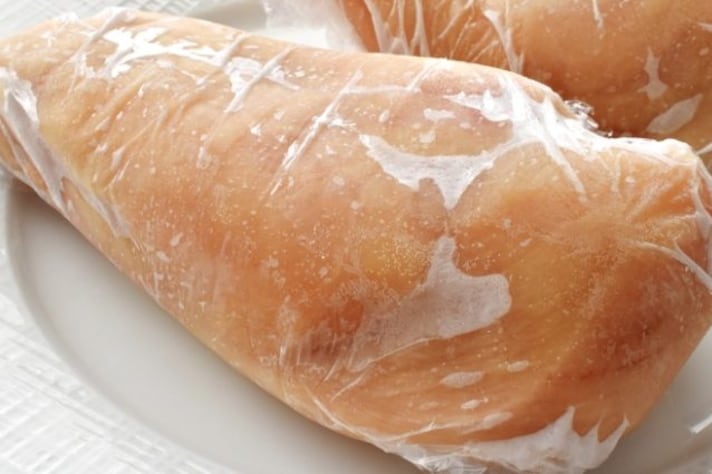Why You Should Never Wrap and Store Chicken Meat in Cling Film
Storing chicken in cling film might seem convenient, but it’s a big mistake. The plastic traps moisture, promotes bacterial growth, and doesn’t protect against air exposure or cross-contamination. For safer, longer-lasting storage, opt for airtight containers or freezer bags. Learn why cling film is not the right choice for your chicken.

When it comes to storing chicken, many people reach for the trusty cling film to wrap it up and toss it in the fridge. It seems like a quick and convenient solution, but this is actually a big mistake. You might think you're keeping your chicken fresh, but wrapping it in cling film can do more harm than good. Let’s break down why cling film isn’t the best option for storing chicken meat and what you should be doing instead.
Cling Film Traps Moisture
One of the biggest problems with cling film is that it traps moisture. When you wrap chicken in plastic wrap, the moisture from the chicken doesn't evaporate and ends up being trapped against the meat. This creates the perfect environment for bacteria to thrive. Chicken, being a high-risk food when it comes to foodborne illnesses, requires special care when storing it. Trapping moisture increases the risk of contamination and bacterial growth, especially in a warm fridge environment.
While cling film may seem like a great way to keep things tidy, it’s actually a breeding ground for the very bacteria you want to avoid, like Salmonella and Campylobacter. In fact, the moisture trapped within cling film can lead to quicker spoilage, making your chicken unsafe to eat much faster than if it were stored properly.
Cling Film Doesn't Protect Against Air Exposure
Another issue with cling film is that it doesn't offer much protection against air. Oxygen exposure is one of the main reasons food spoils, as it accelerates the breakdown of food’s structure and promotes oxidation. Wrapping chicken in cling film does little to prevent air from getting to the surface of the meat. Even if you think you’ve wrapped it tightly, tiny gaps can allow oxygen to seep in. This exposure not only affects the freshness of the chicken but also increases the likelihood of freezer burn if you’re storing it for a longer period.

Cling Film Doesn’t Prevent Cross-Contamination
If you’re handling chicken with your hands and then wrapping it in cling film, there’s a real risk of cross-contamination. The cling film doesn’t provide a proper barrier, meaning bacteria on the chicken’s surface can transfer to other items in your fridge. If you place the wrapped chicken on a shelf or near other foods, you might unknowingly spread germs to ready-to-eat items like vegetables, fruits, or leftovers. This cross-contamination is a health hazard that is far too easy to overlook when storing chicken improperly.
Furthermore, if the cling film is ripped or punctured, it won’t be able to contain the juices from the chicken. These juices can leak, spreading harmful bacteria around your fridge. Storing chicken in an airtight, leak-proof container is a much safer and more hygienic choice.
The Danger of Using Cling Film for Long-Term Storage
When it comes to freezing chicken, cling film is even less suitable. Freezing chicken in cling film can result in freezer burn, which occurs when moisture from the meat evaporates and ice crystals form on the surface. While this doesn’t necessarily make the chicken unsafe to eat, it certainly affects the taste and texture. Freezer burn dries out the chicken, leading to a tough, unpleasant texture once cooked.
Using cling film to wrap chicken for freezing is also problematic because it doesn’t provide the tight seal needed to protect the chicken from freezer air. As mentioned earlier, exposure to air accelerates spoilage, and this is especially true in the freezer. If you plan to freeze chicken, opt for vacuum sealing or heavy-duty freezer bags, which will provide a much tighter, longer-lasting seal.

What’s the Best Way to Store Chicken?
Now that you know why cling film isn’t ideal for storing chicken, you might be wondering what the best alternative is. To safely store chicken, always use an airtight container. This can be a plastic or glass container with a secure lid that seals out both moisture and air. If you’re storing chicken in the fridge for a short period, make sure it’s in a container that prevents any juices from leaking out. For long-term storage, especially if you’re freezing it, invest in freezer-safe bags or vacuum-sealed bags that can keep air and moisture at bay.
In addition, always ensure that your fridge is at the right temperature (below 40°F or 4°C) to slow the growth of harmful bacteria. For freezing, keep your freezer at 0°F (-18°C). This will help maintain the chicken’s quality and ensure it stays safe to eat when you’re ready to cook it.
;Resize,width=767;)
;Resize,width=712;)

;Resize,width=712;)
